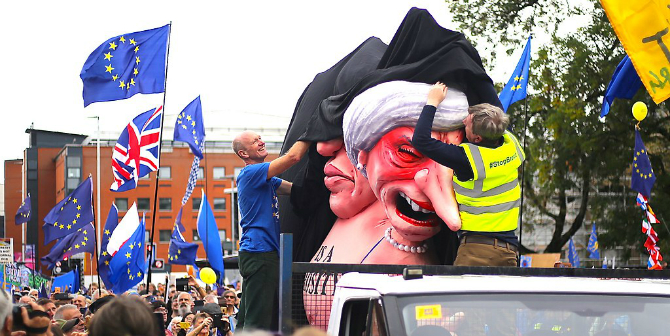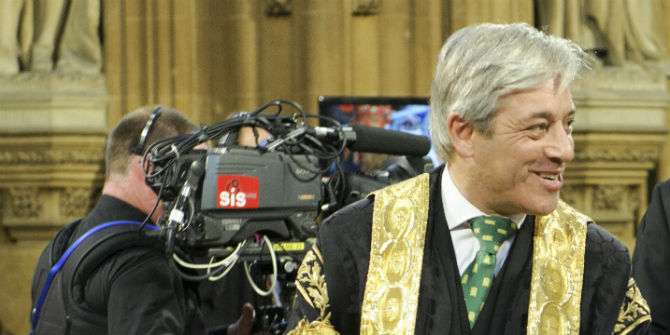 Comedy is inherently linked to identity. Joking enables us to present ourselves and our view of the world to others while simultaneously inviting them to form connections with us through laughter. If you are ‘in’ on the joke, you form a connection with the joke-teller; you are (however briefly) a community united by humour. So what does this have to do with Brexit? Quite a bit, argues Ellie Tomsett (Birmingham City University).
Comedy is inherently linked to identity. Joking enables us to present ourselves and our view of the world to others while simultaneously inviting them to form connections with us through laughter. If you are ‘in’ on the joke, you form a connection with the joke-teller; you are (however briefly) a community united by humour. So what does this have to do with Brexit? Quite a bit, argues Ellie Tomsett (Birmingham City University).
Arguably the reason why Brexit is such a complex and yet unavoidable comedy topic in the current context is that it cuts across such a wide range of identity characteristics. Much of the campaigning and post-vote journalism regarding Brexit attempted to ham-fistedly siphon off identity characteristics against each other: the working-classes versus the liberal elite, second-generation British Asians versus newly arrived Central-Eastern European communities, Michael Gove versus pretty much everyone (especially experts). Figures published by the BBC earlier this year state that just over 13,000 UK citizens obtained nationality from another EU state in 2017. These statistics highlight just how complex notions of identity have become, as people try to remain connected to the EU, post-referendum. Brexit presents major complications for comedy as what we find funny shifts and evolves alongside our sense of identity, both as individuals and in relation to national identity.
As a researcher of comedy, Brexit has been an inescapable topic since the announcement of the referendum back in 2016. I’ve seen comedians unite audiences with jokes that poke fun at the uncertainty of the process that the UK is now undertaking. Conversely, I have also seen some comics struggle to find common ground with audiences who, as a collective, hold a myriad of views on the topic. Current mainstream comedy may well evidence a more ‘remain’ sensibility, as comedians have a unique licence to critique those in power (and those in power are currently enacting the leave process). Joking about Brexit is a very difficult thing to do as views about leaving the EU continually change and evolve in the light of new information about the practicalities of enacting the outcome of the referendum. It is easy for comedians to crash and burn on stage as a result of misplaced assumptions regarding audiences’ attitudes.
 Image by CC BY-SA 4.0.
Image by CC BY-SA 4.0.
Concepts of identity are vital as there are three key aspects of a joking exchange that directly link to who we think we are. These are summarised as the teller of the joke, the audience for the joke, and the butt of the joke. This is the case for both humour occurring in a social setting between individuals and humour displayed as part of a comic performance. Joke tellers or audiences may perform a dual function, operating as the butt of the joke too (e.g. a comedian that self-deprecates and tells jokes about themselves, is both the teller and butt of the jokes). The role of the butt of the joke doesn’t have to be a person. It can be an object, experience or group rather than an individual. However, above all, for comedy to work (evoking laughter in an audience), participants in a joking exchange must understand the concepts being played with. If audiences cannot understand the premise of a joke, they are not going to find it funny. This is why stereotypes loom so large in mainstream and mass televised comedy as they ensure the widest number of people can understand the premise and be ‘in’ on the joke. The issue for comedians is that what the audience know in relation to Brexit is constantly on the move, and highly individual. Therefore it is hard for a comedian to factor these individual attitudes and understandings in when talking to the audience as a group. Comics may think they understand their audiences’ attitudes to Brexit, only for it to change significantly at the drop of a hat (or a resignation from the cabinet). This is especially relevant when we consider how stand-up comedians tour the county as, alongside individual Brexit positions, there will be regionally-specific attitudes to the referendum result to contend with – what raises the roof in Hull may not provoke the same hilarity in Harrow.
We can see that the three major approaches to comedy theory can provide a framework for considering comedy about Brexit. Firstly, we have the superiority perspectives that foreground the way that comedy is used to allow one group a sense of superiority over another. Think back to the predominantly racist, sexist and homophobic comedy of the UK’s Working Mens’ Club era for example, when comedy was effectively keeping marginalised groups, well, marginalised. We can see that comedy is regularly ridiculing conflicting political or Brexit-related positions, and manoeuvring one into a place of superiority. This is aided by the current trend of ideologically-loaded contracted words, for example, ‘Brexiteers’ or ‘Remoaners’. Comedy often falls back on a binary opposition between these two stereotypes, and this particular comic opposition shows little regard for nuance. What if (to use the stereotypes) you are neither a crusading flag-waving nationalist, nor a hard-done-by childish Europhile?
Secondly, comedy has been considered in terms of the relief it can provide to a society, acting as a pressure valve to release pent-up tensions. For a brief moment, when we are laughing, the realities of confusing and unresolved political situations are suspended. The satire of panel shows, such as Have I Got News For You? or The News Quiz, or John Crace’s I Maybot (2017), demonstrates how humour that ‘punches up’ at our political rulers provides a break from the seriousness of the current political situation. This relief that comedy can achieve becomes particularly important when we consider how the Brexit debate cuts across multiple identity characteristics. People may well hold different attitudes to leaving the EU to their direct family members, and so finding a sense of collective with others through comedy (irrespective of your position) is particularly helpful and reassuring. In the current context it is very hard to know who occupies contrasting identities to our own, as Brexit seems to have created both unpredictable alliances and divisions across intersectional lines.
Lastly, comedy has been theorised in terms of incongruity, being the subversion of the norm. Arguably the finest example of this in relation to Brexit is Christopher Spencer’s much talked about McFadden’s Cold War Twitter account. Spencer produces photomontages bringing together political leaders, ageing soap stars and half-forgotten TV celebrities to critique the current state of play in a Trumpian and post-referendum world. It’s the incongruous nature of the images that provoke the laughter in that they play with and subvert what we think of as normal or appropriate. This incongruous humour can also be found the unintentionally comic aspects of recent news broadcasts. For example, Danny Dyer insulting David Cameron and shouting ‘where is the geezer?’ whilst a bemused Jeremy Corbyn and Pamela Anderson look on. This combination of people discussing Brexit is reminiscent of a recipe for an improvised comedy sketch! It’s the unexpected shift from what we think is normal to something unexpected or ridiculous that provokes the humour.
In summary, comedy is playing an absolutely vital role in enabling people to come to terms with what Brexit might mean for them as individuals, and also providing a space for people to renegotiate their sense of identity as UK citizens. For comedians, however, it’s a tricky time to create jokes, when all the targets (and audiences’ relationships to them) are moving.
This article gives the views of the author, and not the position of LSE Brexit, nor of the London School of Economics.
Ellie Tomsett is a Lecturer in Media at Birmingham City University and co-founder of Mixed Bill: Comedy and Gender Research Network. Her research focuses on comedy and contemporary feminisms.







Try as I might I cannot raise a laugh at any aspect of what I see as the worst political development in my lifetime. Maybe my children and grandchildren see some comedy in it but I doubt it.